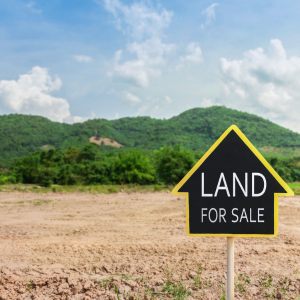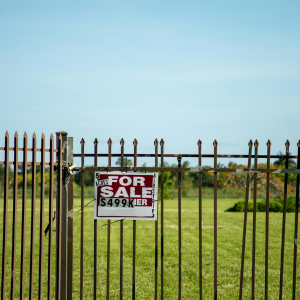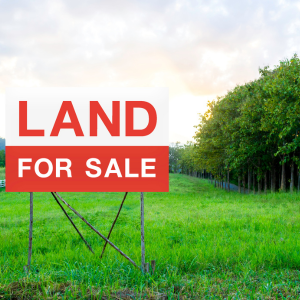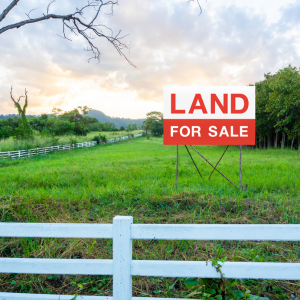
Preparing Your Land for Sale
Before you can sell the land, you need to get the right papers and find out how much it’s worth on the market. To keep things running smoothly, you need to follow some important rules.
What documents do I need to gather before selling my land?
This is what the law says you must do before you can sell your land:
- Deed: This shows who owns it. Check it over and make sure it’s good to go.
- Title Insurance Policy: What is title insurance? This will protect you if there are any issues with the title. Call a title company to make sure it’s right.
- Property Tax Records: Make sure you have up-to-date records so that buyers know about any debts that need to be paid.
- Contract and Disclosure Forms: Give these forms your full attention and write down any problems you know about the property on the Contract and Disclosure Forms.
Having these ready ahead of time can help you avoid delays and earn the trust of people who might buy from you.
How do I determine a fair market price for my land?

You need to set the right price if you want to sell something. To find out how much your land is worth, do these things:
- Market Analysis: Take a look at the housing market to find out what people are willing to pay for a home right now.
- Appraisal: A professional should look at your land and tell you the truth about how much it’s worth.
- Comparable Sales: Find out how much recently sold homes in your area that are similar to your cost. This will help you decide how much to ask for your home.
These things will help you set a fair market price for your land that shows how much it’s really worth.
What are the common land survey issues that buyers look for?
Land surveys tell you a lot about your land. Buyers often think about these things:
- Boundaries and Property Lines: Make sure your neighbors can see your lines so you don’t have any issues with them.
- Zoning and Easements: A look at your property’s zoning will let you know if it can be used for what you want. Also, check for any easements that might make it hard to use.
- Encroachments: It might be harder to own the land or build on it in the future if there are structures or intrusions that aren’t supposed to be there.
Take care of these problems to make buyers feel better and sell the house faster.
Sellers can improve their chances of making a deal if they do these things and get ready well. Call Fast Land Offers to get more information.
Marketing and Advertising Your Land
What are the most effective ways to advertise land for sale without a realtor?
A real estate agent might not be needed to sell land if it cuts down on costs. These are some good ways to do it:
- Online Real Estate Platforms: You can put your house up for sale as “For Sale By Owner” (FSBO) on an online platform if you don’t want to pay a real estate agent.
- Social Media: To get people to share your listing on Facebook, make posts that are interesting. Use interesting text and good pictures to get people to buy.
- Real Estate Marketplaces: Think about niche markets where you can only buy and sell empty land. Here are places where people who are looking for land can go.
- Local Outreach: Putting ads in local papers or on community bulletin boards can bring in people eager to buy homes in the area.
- Networking: Tell your family, friends, and coworkers about the sale. A good way to sell a house is by word of mouth.
With these tips, you can do away with commission fees and talk to buyers straight away.
How can I create compelling online listings for my land?
Someone needs to be able to find your home online and want to buy it. Do these things:

- Clear Headline: Make a catchy headline that talks about where your business is located, how big it is, or something that makes it special.
- Detailed Description: Tell us about the property’s size and zone, how to get to it, and any services or amenities that are close by. Make it clear why your land is so valuable.
- High-Quality Images: Put up several high-resolution pictures of the land so that it can be seen from different angles. A good picture will help your ad stand out.
- Competitive Pricing: To figure out what price to ask, look at homes that are similar to yours. Make the price clear so people can choose if the deal is good or not.
- Calls to Action: Get people to contact you to learn more or set up a visit. Help them ask you a question.
These things can improve the look of your online listing and make people want to buy it.
Should I use online marketplaces or focus on local advertising?
Keep these things in mind as you choose between local ads and online marketplaces:
- Online Marketplaces: These platforms have a broad audience and can help you sell land quickly. They allow you to list your property nationwide and provide tools to market it effectively.
- Local Advertising: People in your area might be interested in your land if you put up ads in your area, or your target market might be close by. Newsprints, flyers, and events are all good ways to reach people in your area.
Both ways have good points. There are two best ways to sell your land: online and in person quickly. Think about your goals and the property’s features when you choose the approach.
Negotiating with Potential Buyers
What are common negotiation tactics buyers use, and how do I handle them?
When you’re negotiating with a potential buyer, it helps to know what kinds of moves they usually make. Buyers often make low offers at first and then try to get the price lowered or ask for extra services. How to handle these plans:
- Lowball Offers: You should back up your price with data or sales that are similar to the one the buyer is making if they make an offer that is much lower than yours.
- Request for Concessions: Be clear about what services or discounts you’re willing to offer ahead of time, and do not change them.
- Time Pressure: Buyers may give you short deadlines to try to rush you. Following your deadline and giving each offer careful thought is important.
If you know these tricks, you can get a wonderful deal.
How can I effectively communicate with potential buyers throughout the process?

You will have a smooth sale if you can talk to each other well. For starters, make sure there are clear ways to chat:
- Understanding Needs: Do not forget to pay close attention to what the buyer wants. This helps you say the right thing.
- Timely Responses: Give full answers to questions right away. If you do this, you’ll look like a professional who is ready to close the deal.
- Feedback and Transparency: Let buyers know about any changes or new information that happen. When you’re honest, people trust you more.
Everyone can understand each other better when they can talk to each other clearly. This also makes it easier to negotiate.
What are the essential components of a legally sound land sale contract?
There are some important things that should be in a land sale contract that will protect everyone:
- Identification of Parties: Write down the names and jobs of everyone who has a stake in the deal.
- Description of Land: Clearly describe the land, including its edges and any buildings that are on them.
- Purchase Price: Write down the price you both agree on and how you plan to pay for it.
- Legal Obligations: A list of what each party needs to do, with due dates for things like closing and getting possession.
- Contingency Clauses: Include conditions like financing or inspections in the contract so that you can get out of it if certain things happen.
- Binding Nature: Everyone should sign to show they agree to the rules.
You should talk to a lawyer to make sure the contract follows the rules in your area and keeps you from having problems.
Handling the Land Sale Transaction
What steps are involved in transferring land ownership?
There are several important steps that must be taken to change who owns land. When both sides agree on the terms of the deal, the process can begin. It is necessary to write a deed that legally changes ownership. In this step, a title company is very important because they make sure the title is free of any problems, such as liens or disputes. They check the title and offer title insurance to protect you from future claims.
The closing stage starts once all the paperwork is ready. This is where the deed is signed and notarized, which completes the change of ownership. It is best to talk to a lawyer to make sure that all the rules are followed and that there are no legal issues that come up during the process.
What are the implications of different types of deeds (warranty, quitclaim)?

When you transfer property, you need to know about the different types of deeds. A warranty deed is the best way to protect the buyer. It makes sure that the seller clearly owns the property and has the right to sell it. It also makes sure that there are no hidden liens or encumbrances that aren’t mentioned in the contract.
A quitclaim deed, on the other hand, is not as safe. It only transfers the seller’s share of ownership, without making any promises about the property’s title. This kind of deed is often used between family members or to fix problems with title.
It’s smart to talk to a lawyer to fully understand what each deed means. Title insurance can give you more peace of mind by protecting you against claims made against the property that you didn’t expect.
How do I ensure a smooth and secure closing process?
If you want a safe and smooth closing, follow these steps:
- Choose a Reliable Title Company: To handle escrow and closing, choose a title company with a good reputation. They will be in charge of the money and all the paperwork.
- Clear Negotiations: Write down and agree on all the terms of the deal, like the price, the date of closing, and any conditions that need to be met.
- Create a Checklist: Before closing, make a list of all the papers and tasks that need to be done, like getting legal advice, going over contracts, and making sure you have enough money.
- Review Closing Documents: Make sure that all of the closing documents are correct. This includes the deed and the settlement statement.
- Get Legal Advice: To avoid mistakes and problems, have a lawyer look over the papers and give you advice throughout the process.
You can make sure the closing goes well by following these steps and keeping the lines of communication open. Fast Land Offers tells both buyers and sellers to be careful during the closing process so that everything goes well.
Protecting Yourself During the Sale
What are the potential risks involved in selling land without legal representation?

Selling land can be complicated, and doing it without a lawyer brings certain risks. These include legal disputes, title issues, and problems proving ownership. Without an attorney, you might miss important legal advice. For Sale By Owner (FSBO), transactions are particularly prone to errors about property rights, leading to disputes. To ensure a smooth sale, be aware of these risks.
How can I mitigate the risks of disputes or title issues?
To reduce the chances of disputes or title issues:
- Title Insurance: Get title insurance to protect against claims from previous owners.
- Contracts and Deeds: Make sure contracts are clear and deeds are correctly recorded. This clarifies the roles of the buyer and seller.
- Legal Counsel: Even if avoiding a lawyer, getting some legal advice on essential documents can protect your sale.
- Disclosure and Verification: Disclose known issues and verify all property details to avoid legal conflicts.
- Proper Documentation: Keep thorough documentation to ensure the transaction is legal and clear.
These steps help protect everyone involved and keep the sale on track.
FAQs:
When is it advisable to seek professional advice despite wanting to avoid a lawyer?
Sometimes, hiring a real estate lawyer is important, even if you want to skip it. If your sale is complex or involves unique property situations, professional help is necessary. Understanding the risks in your specific sale can help with this choice.
If you’re unsure about real estate laws, consulting with a professional is wise. They can explain tricky legal parts and give advice to avoid costly mistakes. When in doubt, getting expert guidance can ensure a successful land sale.
How can I sell my land without hiring a lawyer?
Selling land without a lawyer involves several steps. Start by learning local real estate laws and your ownership rights. List your property on online platforms like Craigslist or FSBO (For Sale By Owner) sites. Prepare all the necessary paperwork, such as deeds and contracts. If you have questions about complex transactions, it might help to consult a real estate professional.
What are the common risks of selling land independently?
Selling land without legal help can lead to risks like improper paperwork, undervaluing your property, or boundary disputes. It’s important to do thorough research, understand zoning laws, and ensure all transactions are legally binding to protect both you and the buyer.
Is it possible to negotiate land sales without an attorney?
Yes, you can negotiate land sales without an attorney. Know the market values and be clear about your asking price. Successful negotiation often means understanding the buyer’s needs and addressing their concerns professionally.
How do I determine the value of my land before selling it?
To determine your land’s value, consider location, size, zoning rules, and current market trends. Comparing recent sales of similar properties in your area can give you a good estimate. Professional appraisals or advice from real estate agents can also help you understand your property’s worth.
Are there tax implications when selling land on my own?
Yes, selling land can lead to taxes, like capital gains taxes. It’s crucial to understand how these taxes affect you and think about consulting a tax advisor to ensure compliance. Proper disclosure of all financial aspects is essential in any real estate transaction.
What documents are required for a land sale without legal counsel?
Important documents include the sales contract, a deed (like a warranty or quitclaim deed), and proof of paid property taxes. It’s also wise to include a disclosure statement for known issues with the property. Handling these documents properly ensures a smooth transaction.
Can I use online marketplaces to sell my land effectively?
Yes, online marketplaces are effective for selling land. Platforms for real estate listing sites can reach potential buyers. Ensure your ad has detailed information, high-quality images, and contact details. Well-presented listings attract more interest and faster sales.
Key Insights
- Learn how to sell land without a lawyer by understanding local real estate regulations in states like Florida, Kentucky, Iowa, Ohio, Wyoming, New Hampshire, and Vermont.
- Discover tips for selling property without legal aid using resources like FSBO (For Sale By Owner) and advice on realtor marketing.
- Explore how to sell vacant land quickly and effectively by attracting serious buyers and negotiating cash offers.
- Gain insights into land ownership sales with guides covering zoning, financing, and potential disputes.
- Stay informed about real estate without a lawyer by reviewing common questions on topics like quitclaim deeds and property taxes.
- Navigate real estate transactions smoothly, whether with or without legal help, from offer to closing.
- Use advertising and outreach techniques for selling property by the owner to boost your market visibility.
- Understand the risks and rewards of real estate investing in raw land, focusing on its development or resale potential.
- Implement a well-rounded plan for land selling, using expert tips to maximize returns.
- Address legal aspects in land contracts and comply with state-specific real estate laws.
- Evaluate the market by analyzing land values and attributes to set the right asking price.
- Optimize your listing with effective marketing strategies to reach homebuyers and investors seeking unique properties.
- Prepare your land for sale by resolving disputes, keeping records, and advertising on various platforms.
- Consult experts if needed for issues like regulatory compliance, ensuring a thorough process.
- Follow step-by-step guides for a hassle-free selling experience, from initial contact to closing the deal.
- Provide useful resources like FAQs to clarify common real estate questions and terms.
- Save time by understanding how factors such as acreage, location, and buyer preferences affect sales.
- Be ready to handle land disputes and legal challenges during the selling process.
- Use direct advertising and social media to connect with potential buyers for a quick sale.
- Develop a strong call to action in your listings to encourage buyers to engage.
- Keep records and documentation up-to-date to support your listing’s credibility.
This information applies to land sales in the United States, including states like Texas, Florida, California, and North Carolina. For additional support, contact us at (843) 606-1001 or visit our website at Fast Land Offers for more details.
Helpful Blog Articles
- How to Market Land for Sale: Effective Strategies to Attract Buyers
- Selling Land on Facebook Marketplace: A Step-by-Step Guide
- How to Sell a Part of Your Land
- A Guide to Selling Land Without an Attorney
- Effective Strategies To Avoid Capital Gains Tax When Selling Land
- Effective Strategies For Selling Land To Out-of-state Buyers In The Real Estate Market
- Do Sellers Need Title Insurance When Selling Land In Real Estate Transactions
- Understanding Real Estate Land Sales Realtor Commission
- Essential Guide To Understanding Closing Costs For Land Purchases In Real Estate
- Essential Guide To Crafting A Vacant Land Purchase Agreement In Real Estate
- Everything You Need to Know to Sell Land on Zillow
- The Ultimate Guide to Selling and Marketing Land

